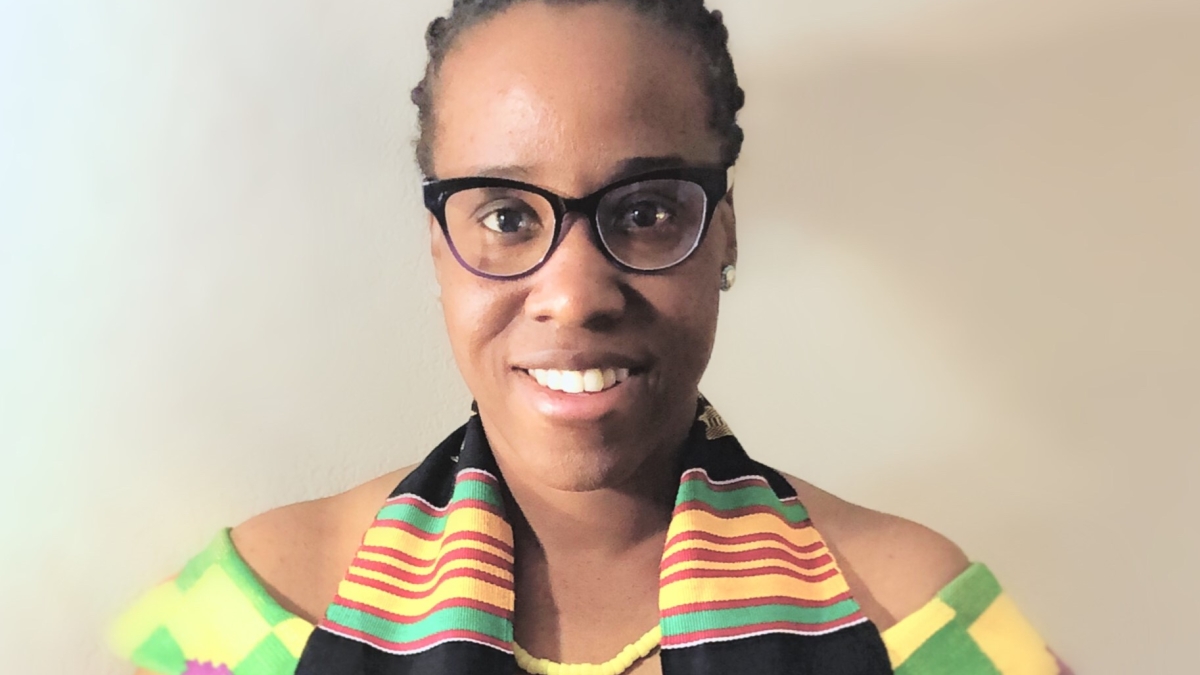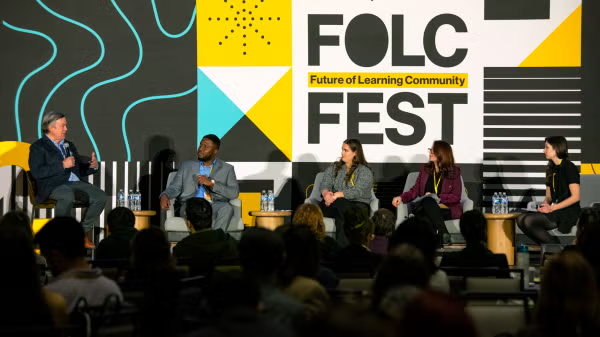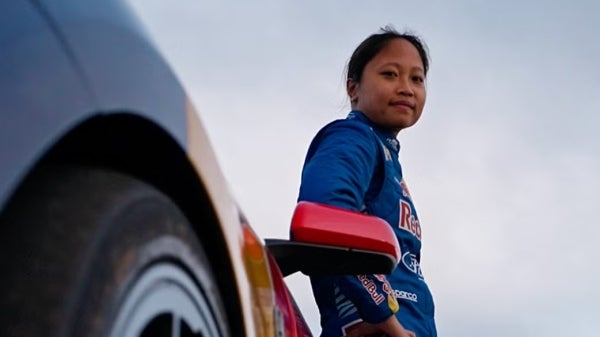ASU Mandela Washington Fellow returns to campus to pursue PhD

Josephine Godwyll, a 2016 Mandela Washington Fellow, received her PhD in sustainable communities from ASU in May 2022. Photo courtesy Josephine Godwyll
Josephine Godwyll was only supposed to be at Arizona State University for a few weeks in 2016. But that was before she met Watts College of Public Service and Community Solutions faculty who strongly believe in the concept of a community whose members, themselves, are part of the solutions to common concerns.
Those meetings inspired her to return to ASU to pursue a PhD in sustainable communities from the college’s School of Community Resources and Development. The university conferred the degree upon Godwyll earlier this month.
Godwyll, who is from the West African nation of Ghana, had originally traveled to ASU to participate in the Mandela Washington Fellowship, a six-week federally funded program for young leaders from Africa.
While at Watts College, she learned how its faculty and curriculum emphasizes research that could have long-term impacts on the places people live.
“The interactions I had with faculty from social work, criminal justice, community resources and development and public affairs were inspiring,” Godwyll said. “It was refreshing to meet a group of scholars who were passionate about centralizing the notion of community and curating user-inspired solutions in their research. Such interactions left me convinced that it was the right place to pursue my interests.”
So Godwyll, who has a background in geospatial engineering, returned to ASU. Her dissertation, which was supported by the Lattie and Elva Coor Building Great Communities Fellowship, focused on access to public spaces in the west Phoenix village of Maryvale, home to a large Latino population. Since 2018, Watts College students, faculty and staff have been advising and assisting residents in revitalizing their community.
“My dissertation focused on reexamining access to public spaces for ethnic minorities. Such spaces encompass areas in the built environment that are open to individual and collective use,” Godwyll said. “Ethnic minorities and Indigenous communities across the world have been at the forefront of economic inequalities and have suffered a plethora of injustices pertaining to the built environment.”
It’s not uncommon for some members of marginalized groups to live near or in places like toxic landfills and redlined neighborhoods disproportionately to the rest of the population, she said, and they have difficulty gaining access to healthy public spaces.
Read on to learn more about Godwyll, her time as a Mandela Fellow and her research into access to resources among underserved populations and their links to community well-being.
Editor's note: Responses have been edited for length and clarity.
Question: Tell us a bit about yourself and your early life. Where are you from and where did you go to school before coming to ASU?
Answer: I grew up in Koforidua, a peri-urbanPeri-urban areas are zones of transition from rural to urban land uses, located between the outer limits of urban and regional centers and the rural environment. community in Ghana, a country on the western coast of Africa. Growing up in my small community in Ghana, neighbors were considered part of one’s extended family, and the role of Indigenous persons and self-organization in the management of resources was not lost on me. Hence, my formative years framed finding myself and my purpose through the realization that each member of the community played a unique role that could not be overlooked.
Encouraged to pursue geomaticGeomatics is the discipline concerned with the collection, distribution, storage, analysis, processing, presentation of geographic data or geographic information. engineering by a dad who had experience with geoinformaticsGeoinformatics is the science and the technology that develops and uses information science infrastructure to address the problems of geography, cartography, geosciences and related branches of science and engineering., I found a synergy between my lived experience and my training in spatial science in the Kwame Nkrumah University of Science and Technology (KNUST).
While engaging with Indigenous communities, I became more aware of the power of storytelling as a path for knowledge transfer. While in school, I led a team of young innovators to create an ed-tech organization, Young At Heart Ghana. The organization advances the use of technology and Indigenous stories in teaching children and has reached over 10,000 students through the apps and hardware developed.
Q: You came to ASU in 2016 as a Mandela Washington Fellow. Tell us about your experiences that year.
A: The Mandela Washington Fellowship was a refreshing and life-changing experience. Foremostly, it provided a platform to connect with other young African leaders from different regions who were using tech platforms as a channel for environmental management and knowledge transfer. It fostered camaraderie and a sense of support through an engagement with young people across the continent, who understood the best of Africa as well as the challenges thereof.
The connections made and lessons shared continue to live on and have yielded collaborations that have been beneficial to ensuring that young people like myself are a part of the solution. The fellowship was beneficial beyond the intrinsic value generated through the interactions among fellows. It allowed for experiential learning curated through the university, to understand organizational structures and systems as pertains to public service and community work.
Through engagements with researchers in the Watts College of Public Service and Community Solutions and visits to centers like the Decision Theater on the Tempe campus, I learned more about maximizing tech platforms as community engagement channels for planning and decision-making. Similarly, site visits to educational spaces such as the Arizona Science Center enlightened me on how the ed-tech organization I led could further adopt tech resources as knowledge transfer mechanisms.
Q: Why did you choose to pursue a doctorate in sustainable communities from the School of Community Resources and Development?
A: I thoroughly enjoyed the engagements I had with researchers in the School of Community Resources and Development. I identified a lot of overlaps with the research I was interested in and the focus areas of the different faculty I engaged. I was particularly fascinated by Professor Christine Buzinde’s work, which, among many other things, had highlighted the well-being of marginalized communities and resource management. Given the wealth of resources and the focus of the school, I realized there was an opportunity for the scholarly exploration of the intersections between my training in geoinformatics and my passion for community development.
Q: What is your next step now that you’ve earned your PhD?
A: I am currently applying the framework I developed to study public space access for other minoritized and marginalized populations such as Indigenous populations, persons living with disabilities and LGBTQ+ populations. The aim of this endeavor is to better understand how such groups perceive and experience access to public spaces, through the exchanges that occur and the related well-being outcomes.
Furthermore, I am applying this framework in the examination of access to recreational spaces in virtual environments. I am doing this by looking at how challenges of access, as they relate to vulnerable populations in the physical environment, are mirrored within recreational spaces in the virtual environments.
Additionally, I am currently in the process of transitioning into a tenure track position in a research university, and I am very excited about the prospects that lie ahead!
Q: What should someone considering undertaking the Mandela Fellowship know that would encourage them to apply?
A: The fellowship is a life-changing experience, one which has both intrinsic and extrinsic benefits for participating fellows and the communities they belong to. While it entails a very competitive process, it is worth every bit of the effort.
More Sun Devil community

FOLC Fest 2025 explores Principled Innovation, leadership and learning at ASU
"Principled Innovation is about using our creativity, knowledge and resources to make decisions that ultimately benefit humanity…

These Sun Devils are inspiring the next generation of female athletes
This year, Women's History Month is celebrating the theme “Moving Forward Together! Women Educating and Inspiring Generations.”…
Founders’ Day 2025 celebrates legacy and innovation at ASU
"Honor the past, celebrate the present and invent the future." This motto encapsulates the spirit of Founders' Day, a…

